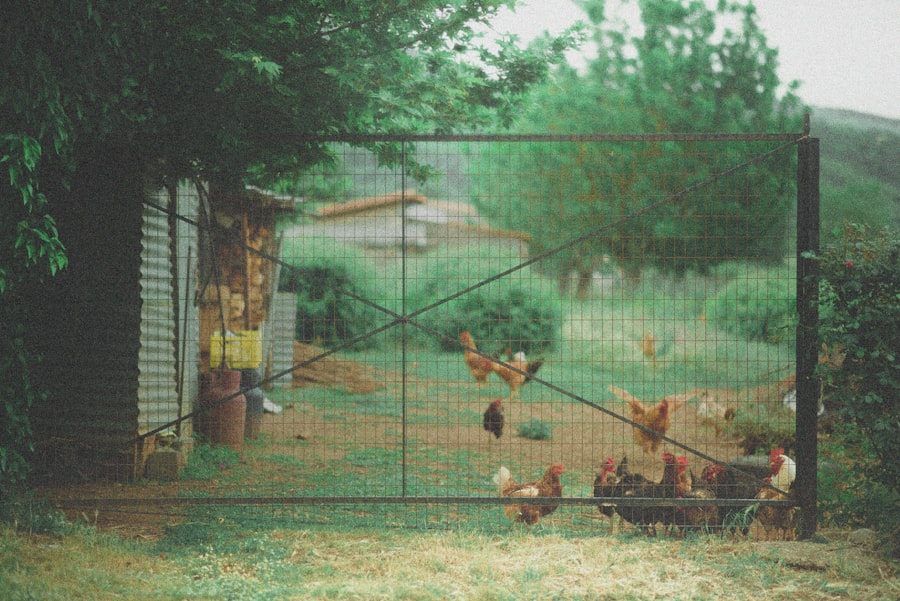Chickens and ticks have a complex relationship that has been observed for centuries. Ticks are ectoparasites that feed on the blood of animals, including chickens. They can transmit diseases such as Lyme disease, Rocky Mountain spotted fever, and ehrlichiosis to both animals and humans.
Chickens, on the other hand, have a natural instinct to forage and scratch at the ground, which can disturb and consume ticks. This behavior makes chickens a valuable asset in controlling tick populations in their environment. Furthermore, chickens have been observed to actively seek out and consume ticks when given the opportunity.
This natural behavior has led to the use of chickens as a biological control method for ticks in various settings, including residential properties, farms, and public parks. By understanding the relationship between chickens and ticks, we can harness the natural instincts of these birds to help manage tick populations in a sustainable and environmentally friendly manner.
Table of Contents
- 1 How Chickens Can Help Control Tick Populations
- 2 The Benefits of Allowing Chickens to Roam Free Range
- 3 Tips for Introducing Chickens to Your Property for Tick Control
- 4 The Importance of Proper Chicken Care for Tick Control
- 5 Other Natural Methods for Controlling Ticks
- 6 Incorporating Chickens into Your Integrated Pest Management Plan
- 7 FAQs
- 7.1 What are ticks and why are they a concern?
- 7.2 Do chickens eat ticks?
- 7.3 Do chickens keep ticks away?
- 7.4 Are there any studies or research supporting the idea that chickens keep ticks away?
- 7.5 Are there any other benefits to keeping chickens in relation to tick control?
- 7.6 Are there any drawbacks to using chickens for tick control?
Key Takeaways
- Chickens can help control tick populations by eating ticks and reducing their numbers in the environment.
- Allowing chickens to roam free range can provide natural tick control and also offer other benefits such as pest control and fertilization.
- When introducing chickens to your property for tick control, it’s important to provide proper shelter, food, and water for the chickens.
- Proper chicken care is essential for effective tick control, including regular health checks, vaccinations, and protection from predators.
- Other natural methods for controlling ticks include using diatomaceous earth, planting tick-repelling plants, and keeping the environment clean and well-maintained.
How Chickens Can Help Control Tick Populations
Natural Foraging Behavior
Their scratching and pecking behavior disturbs the leaf litter and underbrush where ticks often reside, making it more difficult for ticks to find suitable hosts.
Consuming Large Numbers of Ticks
Additionally, chickens have been observed to consume large numbers of ticks when given access to tick-infested areas. Research has shown that chickens can significantly reduce tick populations in their environment. A study conducted by the University of Rhode Island found that chickens reduced the number of ticks in a controlled area by 98%.
Effective Tick Control Method
This demonstrates the potential of using chickens as a natural method for tick control. By allowing chickens to roam freely and forage in areas where ticks are prevalent, property owners can effectively reduce the risk of tick-borne diseases for themselves, their pets, and their livestock.
The Benefits of Allowing Chickens to Roam Free Range

Allowing chickens to roam free range offers numerous benefits beyond tick control. Free-ranging chickens have access to a diverse diet of insects, seeds, and vegetation, which can improve the quality of their eggs and meat. They also have the opportunity to engage in natural behaviors such as dust bathing, sunbathing, and socializing with other chickens.
This can lead to healthier and happier birds. In addition, free-ranging chickens can help manage other pests such as slugs, snails, and small rodents. Their foraging behavior can reduce the need for chemical pesticides and rodenticides, promoting a more sustainable and environmentally friendly approach to pest management.
Furthermore, free-ranging chickens can contribute to soil health by scratching and aerating the ground, which can improve soil structure and nutrient cycling.
Tips for Introducing Chickens to Your Property for Tick Control
When introducing chickens to your property for tick control, there are several important considerations to keep in mind. First, it is essential to provide adequate shelter and protection for the chickens to keep them safe from predators and the elements. This may include a secure coop or shelter with nesting boxes and roosting perches.
Second, it is important to provide access to a suitable foraging area where the chickens can actively seek out and consume ticks. This may involve allowing the chickens to roam freely in areas where ticks are prevalent, such as wooded areas or tall grasses. It is important to monitor the chickens regularly to ensure they are healthy and thriving in their new environment.
Finally, it is crucial to provide a balanced diet for the chickens to supplement their natural foraging behavior. This may include providing access to commercial chicken feed, fresh water, and occasional treats such as fruits and vegetables. By following these tips, property owners can successfully introduce chickens to their property for tick control while ensuring the health and well-being of the birds.
The Importance of Proper Chicken Care for Tick Control
Proper chicken care is essential for ensuring that chickens are effective at controlling tick populations while maintaining their health and well-being. This includes providing access to a balanced diet that meets their nutritional needs, as well as regular access to fresh water. Additionally, it is important to monitor the chickens for signs of illness or injury and provide appropriate veterinary care when needed.
Furthermore, proper housing and protection from predators are crucial for keeping chickens safe and secure on the property. This may involve providing a secure coop or shelter with adequate ventilation, nesting boxes, and roosting perches. Regular cleaning of the coop and removal of waste material can help prevent the spread of disease and parasites among the flock.
Finally, it is important to consider the social needs of chickens by providing opportunities for socialization and natural behaviors such as dust bathing and sunbathing. By prioritizing proper care for the chickens on the property, property owners can ensure that they are effective at controlling tick populations while promoting their overall health and well-being.
Other Natural Methods for Controlling Ticks

Diatomaceous Earth: A Natural Tick Repellent
One method is the use of diatomaceous earth, a natural substance that can be sprinkled in areas where ticks are prevalent. Diatomaceous earth works by dehydrating ticks and other insects upon contact, making it an effective and environmentally friendly option for tick control.
Predatory Insects: Nature’s Tick Controllers
Another natural method for controlling ticks is the use of predatory insects such as guinea fowl or certain species of nematodes that feed on ticks. These natural predators can help reduce tick populations in a given area without the need for chemical pesticides or other harmful substances.
Maintaining a Tick-Free Landscape
Additionally, maintaining a well-manicured landscape with trimmed grass and vegetation can help reduce tick habitat and make it more difficult for ticks to find suitable hosts.
By incorporating these natural methods into an integrated pest management plan, property owners can effectively manage tick populations while minimizing the use of chemical pesticides and promoting a healthier environment for themselves, their pets, and their livestock.
Incorporating Chickens into Your Integrated Pest Management Plan
Incorporating chickens into an integrated pest management plan can offer numerous benefits beyond tick control. Chickens can help manage a variety of pests including ticks, slugs, snails, small rodents, and certain insect species. By allowing chickens to roam freely in designated areas on the property, property owners can reduce the need for chemical pesticides and promote a more sustainable approach to pest management.
In addition to pest control benefits, incorporating chickens into an integrated pest management plan can also contribute to soil health through their scratching and aerating behavior. This can improve soil structure and nutrient cycling while reducing the need for mechanical tilling or chemical fertilizers. Furthermore, free-ranging chickens can contribute to a more diverse and resilient ecosystem by promoting biodiversity through their interactions with other organisms in their environment.
By considering the natural behaviors of chickens and incorporating them into an integrated pest management plan, property owners can effectively manage pest populations while promoting a healthier and more sustainable environment for themselves and future generations.
If you’re interested in learning more about the benefits of keeping chickens, you might want to check out this article on how big a coop needs to be for a chicken. It discusses the importance of providing adequate space for chickens and how it can impact their overall health and well-being.
FAQs
What are ticks and why are they a concern?
Ticks are small arachnids that feed on the blood of mammals, birds, and sometimes reptiles and amphibians. They are a concern because they can transmit diseases to humans and animals, such as Lyme disease and Rocky Mountain spotted fever.
Do chickens eat ticks?
Yes, chickens are known to eat ticks. They are natural foragers and will peck at insects and other small creatures, including ticks, as part of their diet.
Do chickens keep ticks away?
Chickens can help reduce the tick population in an area by eating them. However, they may not completely eliminate ticks, especially in larger areas with a significant tick population.
Are there any studies or research supporting the idea that chickens keep ticks away?
There is limited scientific research specifically on the topic of chickens keeping ticks away. However, anecdotal evidence and observations from farmers and homeowners suggest that chickens can have a positive impact on reducing tick populations in certain areas.
Are there any other benefits to keeping chickens in relation to tick control?
In addition to eating ticks, chickens can also help control other pests such as ants, flies, and grasshoppers. They can also help with soil fertilization and weed control in a garden or yard.
Are there any drawbacks to using chickens for tick control?
Chickens may cause damage to gardens or landscaping as they forage for insects and other food. Additionally, they may not be effective in controlling tick populations in larger or heavily wooded areas. It’s also important to consider the welfare and housing needs of the chickens when using them for tick control.
Meet Walter, the feathered-friend fanatic of Florida! Nestled in the sunshine state, Walter struts through life with his feathered companions, clucking his way to happiness. With a coop that’s fancier than a five-star hotel, he’s the Don Juan of the chicken world. When he’s not teaching his hens to do the cha-cha, you’ll find him in a heated debate with his prized rooster, Sir Clucks-a-Lot. Walter’s poultry passion is no yolk; he’s the sunny-side-up guy you never knew you needed in your flock of friends!







